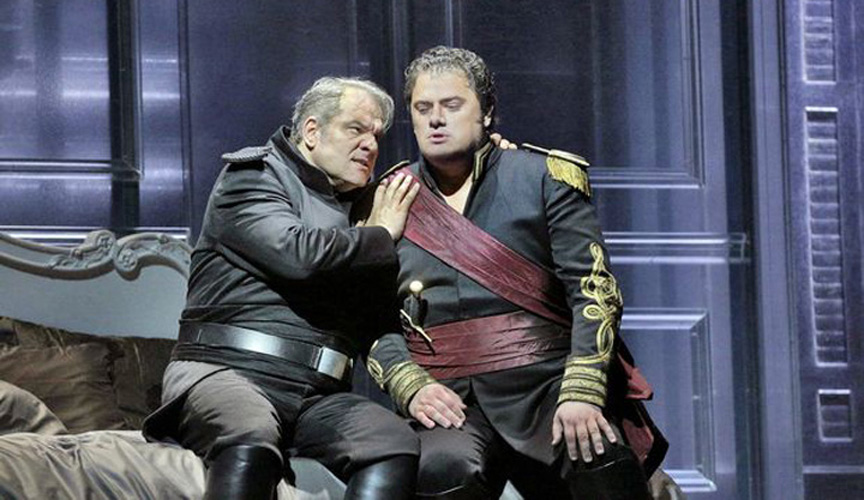
Otello at the Metropolitan Opera, October 2015.
Live movie-theater telecast by Fathom Events.
This is politically incorrect to say, but the portrayal of Otello as a white man in the new Met production is absurd. The whole point of Shakespeare’ (and Verdi’s and Boito’s) drama is the man’s Otherness. The story revolves around his insecurity because of racial prejudice.
Yet the director of the Met’s new production, which opened the season and started the HD cinema series, decided that his title character should not wear dark makeup. Bartlett Sher has the Latvian tenor Aleksandrs Antonenko appear with white skin, like all the other characters in the opera. Sher’s sensitivity is laudable, but his decision sabotaged the drama.
Anthony Tommasini in the New York Times wrote “The use of darkening makeup to suggest a character’s race has long seemed obsolete and insensitive.” But in the play and the opera, Othello/Otello is feared, envied and hated specifically because of his skin color.
Shakespeare’s text (although not the opera) specifies that Othello has “thick lips” and a “sooty bosom” and he’s called a savage. Desdemona’s father, Brabanzio, cannot believe that Desdemona would be attracted to the Moor unless her senses were blinded by Othello’s sorcery. The notion that dark people practiced sorcery was yet another demonstration of racism.
In Shakespeare’s time, and even to many people in Verdi’s time, the union of an “alabaster” white Venetian maiden to a dark-skinned soldier was considered unnatural. This leads to Othello fearing that she cheated on him because of his race.
Shakespeare has Iago say to Desdemona’s father: “Now, very now, an old black ram is tupping (having sex with) your white ewe.” Elsewhere Iago equates interracial sex with bestiality: “You’ll have your daughter covered with a Barbary Horse; you’ll have your nephews neigh to you.”
In sum, Othello is isolated from the other characters particularly by the color of his skin and he is susceptible to Iago because of that. Clearly, Othello’s race is essential to the story.
While the text refers to him repeatedly as a Moor, you might question Othello’s precise ethnicity. In Shakespeare’s time that word was used as a synonym for Negro, Ethiopian and Black, yet he could conceivably literally be a Moor from Morocco. Or, because the play and opera take place in the eastern part of the Mediterranean Sea, it would be logical to have the title character be a darkish-skinned Egyptian or Arab. But imagine the furor if a production portrayed that!
By wiping away all trace of race this production demolishes the drama.
The whiteface decision appears to be a gimmick to attract attention, whereas the focus should be on the musical merits of this great opera.
Yannick Nézet-Séguin led a dynamic interpretation of what arguably is Verdi’s greatest score. The loud climaxes were thrilling and the soft tender moments were even better. High spots were his handling of the crowd scene at the end of Act III when, in the presence of the dignitaries from Venice, Otello throws his wife to the ground and calls her a whore, and the quiet arias as Desdemona goes to bed in the last act. In the former, Nézet-Séguin shaped the long lines clearly, building inexorably towards the climax; in the latter he projected delicate fragility.
Antonenko, with his steely tenor voice, makes a credible Otello but not a great one. He sings musically, but doesn’t explore the depths of this man’s soul. The transcendent interpreters, like Ramon Vinay (the first one I saw), Mario Del Monaco, James McCracken and Jon Vickers, conveyed near-hysteria. The man, after all, must be nearly insane to murder the woman who is the love of his life. Accordingly, the singing of those giants displayed their fierce attempts to suppress raging passion. Antonenko is not in that class.
Zeljko Lucic sang very well as Iago, even better than his Macbeth, Di Luna and Rigoletto. The conception of the character, though, was odd. He shrugged as he casually told the audience how he was humiliating his commander, treating it as a game. That could work when doing the Shakespeare play, but Verdi and Boito added the aria in which Iago brags that he believes in a cruel God “who created me in anger…I am a son of evil.” In other words, he is evil incarnate. There’s nothing casual about that.
Soprano Sonya Yoncheva sang beautifully as Desdemona. We often see wan lyric sopranos in this part and Yoncheva presented a more forthright woman.
Aside from the facial color, the most noticeable staging innovation is the presence of translucent sliding structures that suggest various locations, indoors and out. The movements of the walls distract and don’t add anything significant to the drama. What’s more, the structures look more like the lobbies and staircases of high-rises in Manhattan than any buildings on Cyprus. Projected images of mists and churning waves are effective in setting the mood of danger.
One other oddity in Sher’s staging was how he handled the chorus in the opening scene. A raging storm threatens to sink Otello’s ship and crowds on the shore look straight out to the sea. But there was no visible emotion nor movement; I felt almost as if we were back at the Met production of Britten’s Peter Grimes when choristers stared into the house interminably. Then, at the end of that first act, there were no visible stars as Otello and Desdemona sang about them.
Is a puzzlement (as the king of Siam used to say) how Bartlet Sher, who helmed beautiful productions of The King and I and South Pacific at Lincoln Center, failed to ignite the explosives within this Otello. Gary Halvorsen directed an extraordinarily vivid telecast of the production. It’s worth looking for on encore bookings.
See more opera reviews on theculturalcritic.com